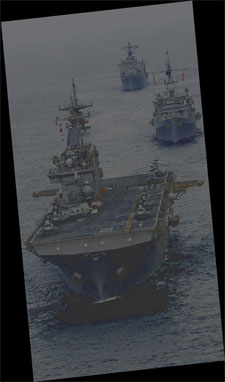 Economics
driving politics globally, but posers remain Economics
driving politics globally, but posers remain
With economics increasingly driving politics in the current world
order, the reported decision by the US to beef-up its naval muscle in
the Asia-Pacific region may have come as somewhat of a surprise to many
an observer. The development could seem to be a reconfirmation of the
widely held perception that a rising US-China power struggle would be an
essential feature of the emerging international power system.
However, US Defence Secretary Leon Panettta was very careful with his
words when he explained the rationale behind the reported US decision to
reposition the majority of its warships in the Asia-Pacific region,
which is a highly dynamic centre of global economic productivity and
growth: ‘Some view the increased emphasis by the United States on the
Asia-Pacific region as some kind of challenge to China. I reject that
view entirely.
‘Our effort to renew and intensify our involvement in Asia is fully
compatible with the development and growth of China. Indeed, increased
US involvement in this region will benefit China as it advances our
shared security and prosperity for the future’, Panetta was quoted
telling a security forum in Singapore recently.
With the US no longer facing a serious ideological challenger
worldwide, since the drawing to a close of the Cold War and the US-USSR
global confrontation in the late eighties, the question arises as to why
the US would need to intensify its security in the Asia-Pacific region
and that too in perceived collaboration with China.
Political ideology
|

This US Navy file handout shows the
amphibious ship USS Essex (LHD 2)
and the Essex Amphibious Ready
Group (ARG). The United States will
shift the majority of its naval fleet to
the Pacific by 2020 as part of a new
strategic focus on Asia, Pentagon
Chief Leon Panetta told a summit in
Singapore on June 2, 2012. AFP |
In the Cold War years, the Western bloc and its allies were under
compulsion to protect and advance their perceived political ideology and
way of life, besides their security and economic interests, against
their enemy the East bloc and its allies, on a global scale, but such
compulsions no longer exist today in a major way. Liberal democracy and
its corresponding economic regime of the ‘free market’ are seen as the
preferred political and economic structures, respectively, of the world
and the observer could be puzzled at the pronouncement that a notable
security threat confronts the US in the Asia -Pacific.
Barring just a few former communist countries of not so significant
power, the US currently has defence and security arrangements of some
sort with the majority of major Asian countries, many of them highly
productive economically and which make common cause with the West
particularly in respect of economic ideology.
Japan, South Korea and Indonesia, for instance, are three such states
and they are industrial powers of the first order. It is to be noted
that India too is in the process of improving its ties with the US and
could be expected to make common cause with the US on issues pertaining
to economic policy in particular.
Moreover, the US is a major backer of India’s bid to obtain Permanent
Membership of the UN Security Council and this too is a thought
provoking move when the larger international power realities of Asia are
taken into account. Apparently, the US would like to see India emerge as
a predominant economic, political and military power in Asia, perhaps as
a counterbalance to another power centre or centres which may not be
very well in tune with the US’ interests in the Asian region.
Asia-Pacific region
China means mainly ‘business’ in the Asian region. It is currently
seeking to increase its investment and commercial ties with a number of
Asian states, besides seeking to do the same even in the African
continent and some parts of Latin America. But it is quite some time
since China left behind the ideology of what is known as the statist,
‘closed economy.’ In this respect it is at one with the US and the
latter could be right in seeing China as sharing some of its major
economic concerns.
In fact, the US’ continuing ‘trade and currency wars’ with China are
proof that it would be in the countries’ interests to keep their
economic ties in a state of vibrancy.
Given this relatively promising backdrop from the viewpoint of the
countries concerned, it is difficult to see why the US would need to
boost its naval power in the Asia-Pacific region, unless the US has it
at the back of its mind that perceived Chinese expansionism in the
region must be checked.
After all, the US could not see a significant threat emerging to its
influence in the region, except from China. Recent inter-state squabbles
over the economic and strategic resources of the South-China Sea in
particular, could intensify this US perception of a military threat from
China.
So, generally speaking, economics are driving politics globally, but
in the Asia-Pacific region there is a residue from the former
confrontational politics between the West and communism, which is
prompting the US to look over its shoulder at China, lest its position
as a number one power-wielder is threatened. |



